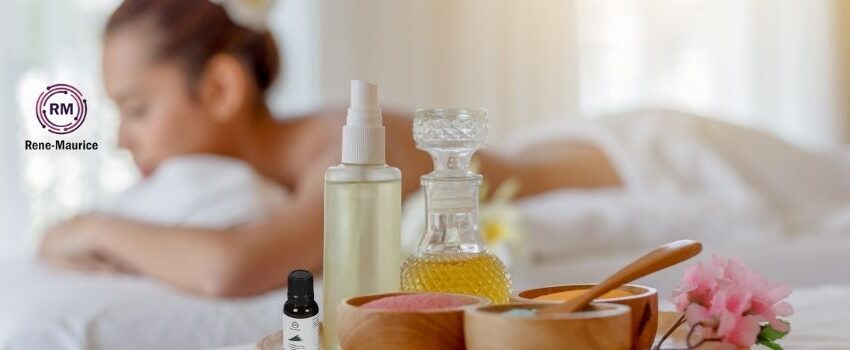
What Is Aromatherapy And Its Benefits?
Welcome to the soothing world of aromatherapy! Have you ever wondered how a simple whiff of lavender or peppermint can transport you to a state of relaxation and calm? In this blog post, we will delve into the fascinating realm of aromatherapy. Its origins, benefits for both physical and mental well-being, different types of essential oils, techniques for using them effectively, and much more. Get ready to unlock the power of scent and discover a natural way to enhance your health and happiness!
What Is Aromatherapy?
Aromatherapy is a holistic healing practice that harnesses the therapeutic properties of essential oils extracted from plants to promote overall well-being. These potent oils are carefully distilled or extracted to capture the plant’s essence, which can then be inhaled, applied topically, or used in various treatments.
The aroma of these essential oils stimulates the olfactory system. And sends signals to the brain, triggering emotional and physical responses. This results in various benefits, from relaxation and stress relief to improve sleep and heightened focus.
Each essential oil boasts unique properties targeting specific issues like headaches, inflammation, anxiety, or fatigue. Whether you’re seeking relaxation after a long day or an energy boost to kick-start your morning, there’s an essential oil for every need in aromatherapy.
History Of Aromatherapy And Its Origins
Aromatherapy has a rich history that dates back thousands of years. The practice of using aromatic plants for healing and well-being can be traced to ancient civilizations like the Egyptians, Greeks, Romans, and Chinese. These cultures recognized the therapeutic benefits of essential oils extracted from plants through distillation or other methods.
The term “aromatherapy” was coined in the early 20th century by French chemist Rene-Maurice Gattefosse after he accidentally discovered the healing properties of lavender oil on his burnt hand. This serendipitous event led to further research and popularization of aromatherapy as we know it today.
Over time, aromatherapy has evolved into a holistic approach to health and wellness, incorporating not only physical but also emotional and mental well-being. The use of essential oils in aromatherapy is based on the belief that these natural plant extracts can promote healing and balance within the body and mind.
As interest in natural remedies continues to grow, the popularity of aromatherapy has surged worldwide. Today, it is widely practiced in spas, homes, hospitals, and wellness centers as a complementary therapy for various ailments and conditions.
How does Aromatherapy work?
Aromatherapy works by harnessing the power of natural essential oils to promote overall well-being. When inhaled or applied to the skin, these potent plant extracts can have various therapeutic effects on the body and mind.
The aroma of essential oils stimulates the olfactory system, sending signals to the brain’s limbic system which controls emotions and memory. This direct connection is why certain scents can evoke specific feelings or memories.
Essential oils also contain active compounds that can be absorbed into the bloodstream through inhalation or topical application. Once in the body, these compounds can interact with different systems to produce a range of benefits, from reducing stress and anxiety to relieving pain and inflammation.
Whether used in massages, baths, diffusers, or sprays, aromatherapy offers a holistic approach to health and wellness by targeting both physical and emotional aspects simultaneously.
Benefits Of Aromatherapy For Physical Health
Aromatherapy offers a wide range of benefits for physical health. The use of essential oils in aromatherapy can help alleviate various physical ailments and promote overall well-being.
Certain essential oils like lavender, peppermint, and eucalyptus have analgesic properties that can reduce pain and inflammation in the body when used topically or through inhalation.
Moreover, aromatherapy can aid in improving circulation and boosting the immune system. Oils such as lemon, rosemary, and tea tree are known for their antimicrobial properties which can help fight off infections.
In addition to this, aromatherapy is effective in reducing symptoms of conditions like headaches, muscle tension, and digestive issues. By incorporating essential oils into your daily routine, you may experience improved physical health and a greater sense of vitality.
Benefits Of Aromatherapy For Mental Health
Aromatherapy offers a myriad of benefits for mental health. The use of essential oils can help alleviate stress, and anxiety, and promote relaxation.
Lavender oil is known for its calming properties and can aid in reducing feelings of tension and promoting better sleep quality. Citrus oils like lemon and orange are uplifting scents that can boost mood and energy levels.
Peppermint oil is invigorating and can help enhance focus and concentration. Frankincense has been used for centuries to promote emotional balance and reduce feelings of negativity.
Using aromatherapy as part of your self-care routine can contribute to overall well-being by creating a soothing atmosphere in your home or workspace. Whether through diffusing oils or adding them to bath products, incorporating aromatherapy into your daily life can have a positive impact on your mental health.
Different Types Of Essential Oils And Their Uses
When it comes to aromatherapy, essential oils play a vital role in enhancing both physical and mental well-being. There is a wide variety of essential oils available, each with its unique properties and benefits.
Lavender oil is popular for its calming effects, making it ideal for reducing stress and promoting relaxation. Peppermint oil is known for its invigorating scent which can help alleviate headaches and boost energy levels.
Tea tree oil has powerful antibacterial properties, making it great for treating skin conditions like acne or minor cuts. Eucalyptus oil is commonly used to relieve congestion and clear the sinuses during colds or allergies.
Citrus oils such as lemon or orange are uplifting and refreshing, perfect for boosting mood and creating a positive atmosphere. Rosemary oil is often used for improving focus and concentration, making it great for studying or working on tasks that require mental clarity.
Each essential oil brings healing benefits to the practice of aromatherapy, allowing individuals to tailor their experience based on their specific needs.
How To Use Essential Oils In An Aromatherapy Diffuser
Using essential oils in an aromatherapy diffuser is a simple and effective way to enjoy the benefits of aromatherapy. To start, choose your favorite essential oil or blend – popular choices include lavender for relaxation or peppermint for an energy boost.
Fill the diffuser with water according to the instructions provided. Add a few drops of your chosen essential oil into the water – usually, 3-5 drops are enough, but you can adjust based on your preference and room size.
Turn on the diffuser and let it disperse the aromatic mist into the air. The gentle diffusion will fill your space with a pleasant fragrance that can help promote relaxation, improve mood, or even alleviate congestion.
Remember to clean your diffuser regularly to prevent buildup and ensure optimal performance. Experiment with different essential oils and blends to find what works best for you and enjoy the calming effects of aromatherapy in your daily life.
Also Read:- Sleep Disorders
Aromatherapy Techniques And Treatments
Aromatherapy techniques and treatments involve a variety of methods to harness the benefits of essential oils for overall well-being. One popular technique is inhalation, where the aroma of essential oils is inhaled directly or through a diffuser to promote relaxation or invigoration.
Another common method is topical application, where diluted essential oils are applied to the skin during massages or added to skincare products for their therapeutic effects. Essential oil blends can also be used in baths for a soothing experience.
Aromatherapy treatments may include full-body massages using specific essential oil combinations tailored to individual needs. These massages not only relax tense muscles but also provide mental clarity and emotional balance.
Diffusing essential oils in the air can create a calming atmosphere at home or in spa settings. This practice not only freshens up space but also helps alleviate stress and promote better sleep quality.
Aromatherapy techniques and treatments offer natural solutions for enhancing physical, mental, and emotional health without harsh chemicals or side effects.
Also Read:- सोने से पहले की आदतें
Conclusion
As we wrap up our exploration of aromatherapy. It becomes clear that the benefits of this practice are vast and varied. From its roots in ancient civilizations to its modern-day applications, aromatherapy continues to offer a natural and holistic approach to health and well-being. By harnessing the power of essential oils, individuals can experience physical relief, mental clarity, and emotional balance.
The diverse range of essential oils provides options for addressing specific concerns or simply enhancing overall wellness. Whether seeking relaxation with lavender or invigoration with peppermint, there is an oil for every need. Utilizing these oils in diffusers allows for easy integration into daily routines, creating a soothing atmosphere at home or work.
Aromatherapy techniques like massage therapy or inhalation further enhance the effectiveness of essential oils in promoting healing and relaxation. As more research emerges on the benefits of aromatherapy, its recognition as a valuable complementary therapy continues to grow. Explore the world of aromatherapy to discover how it can enrich your life and well-being.
FAQs
Q: Is aromatherapy safe for everyone?
A: While generally considered safe, it’s important to consult with a healthcare provider before using essential oils, especially for pregnant women, children, and individuals with certain medical conditions.
Q: Can aromatherapy replace traditional medicine?
A: Aromatherapy can complement traditional medicine but should not be used as a substitute. It is advisable to use it in conjunction with other treatments under the guidance of a healthcare professional.
Q: How long does the scent of essential oils last in a room?
A: The duration varies depending on factors like the type of oil used and the method of diffusion. On average, the scent can linger from 1-4 hours after diffusing.
Q: Are there any side effects of aromatherapy?
A: When used properly, aromatherapy typically has minimal side effects. However, some people may experience allergic reactions or skin irritation. Always do a patch test before widespread use.
Exploring the world of aromatherapy can bring about both physical and mental benefits that enhance overall well-being. By harnessing the power of natural essential oils through various techniques and treatments, individuals can unlock a holistic approach to health and relaxation. Whether you’re looking to alleviate stress or boost your immune system, incorporating aromatherapy into your daily routine may just be the aromatic solution you’ve been searching for.


